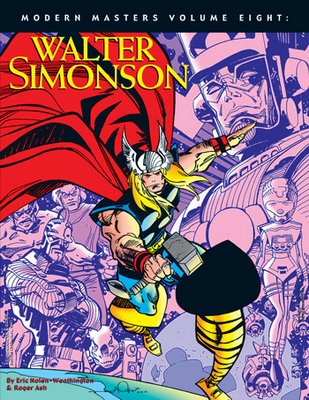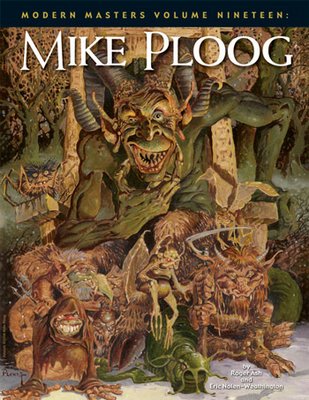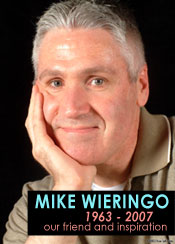a few months back, realizing that my schedule was getting a bit overbooked and hoping to keep this three-times-a-week blog on such a schedule, i put out the call to anyone within the sound of my voice offering a shot at being a guest blogger (and thereby giving me a chance to get some actual perhapanauts work done...!). while the response wasn't what i'd call overwhelming, i was grateful to my pal, roger ash and kc carlson for offering to help in any way possible! kc and roger are both wisconsin boys, both huge comics fans, and both well respected, seasoned interviewers. here, roger takes us on a walk through some of the lessons that he's learned in his long career as an inquiring journalist...
When Todd asked for people to write guest blogs, I emailed him and offered to write one about things I’ve learned as an interviewer. He liked the idea and here we are. Before we begin, you’re probably wondering why you should even listen to me. I’m not sure of that either, but let me give you some of my credentials. I’ve been doing interviews for Westfield Comics since 1994. My first was with Todd McFarlane about the Spawn/Batman crossover he did with Frank Miller. The past few years, I’ve usually done two or three interviews a month. That adds up to a heck of a lot of interviews. I’ve also written a number of pieces for TwoMorrow’s Back Issue magazine (including the Ann Nocenti/Arthur Adams interview in the current issue); interviewed Walter Simonson for his Modern Masters book; and, earlier this year, interviewed Mike Ploog for a Modern Masters volume that will be out in October, which, given the work that Mr Ploog is best known for, is highly appropriate. Both of the Modern Masters books were edited by series creator, Eric Nolen-Weathington. So, if you’ve enjoyed any of those, you might like this.
The first thing I learned, I actually learned years before I ever did my first interview. Back in the 80s, when I was in college, I read a profile in Playboy of musician Little Richard written by film maker John Waters. By the end of the article, I knew more about how John Waters felt about Little Richard than I did about Little Richard himself. That may well have been the intent of Playboy’s editor, given the fact that Waters is a strong personality, but it made me mad. I wanted to learn about Little Richard, and I didn’t. That lead me to realize that people read interviews to learn about the person who is being interviewed, not the person doing the interviewing. I don’t care who you are, how famous you are, or how clever you think you are, the spotlight should shine on the person being profiled. To that end, I try to make myself as unobtrusive as possible when I’m doing an interview.
This doesn’t mean, however, that your personality won’t come through. I used to think that I didn’t have an interview style. Most of my interviews for Westfield are short and to the point. There was no room for personality there. When I interviewed Walter Simonson, which was my first long interview, I learned differently. As I was proofreading it, I realized that it read like one of my short interviews, only longer. My personality comes through in the questions I ask and what I ask about. The questions are ones that I think to ask and are phrased in the way I think. I emphasize things that interest me and downplay things that don’t. I believe that’s true of anyone. Another interviewer could have gotten the same information from Walter that I did, but it would have read very differently.
The next thing I learned is to do your research. This is of major importance. We’ve all read or seen interviews where it’s obvious that the interviewer doesn’t know what they’re talking about. It’s painful and it’s embarrassing. When I worked on the Modern Masters interviews, I read every piece of work by both Simonson and Ploog that I could lay my hands on. I read old interviews with them. With Ploog, I even watched some of the movies that he worked on. Even though I love, for example, Simonson’s run on Thor and Ploog’s work on Man-Thing, I didn’t remember everything about them. Research is absolutely essential. Do I over research? Maybe, but I think that the end result is worth it.
This comes with a warning. You’ve just done all this research, so you know a great deal about the work of the person you’re interviewing. Don’t assume your audience knows as much as you do, because they probably don’t. Make sure that others can follow what’s going on in the interview and that you don’t skip necessary details. Something that can help is to ask yourself two questions: “what do I want to know?” and “what to I think my readers want to know?” For example, when I was researching the Simonson Modern Masters, I read enough about Walter’s run on Thor to know about the creation of Beta Ray Bill. I still needed to ask him about that because people reading the book might not know that, and it’s an important part of his Thor. Readers would want to know that. While doing the research, I realized that Sif, as drawn by Walter, looked quite a lot like Sigourney Weaver and I was curious if he used her as a model. I asked him about that because it was a question to which I wanted to know the answer. Asking questions both you and your readers want to know the answers to makes for a well-rounded interview.
Another good way to make sure your interview is understandable is to have someone proofread it. (Hi KC!) They can point out things that don’t make sense to them and you can make the appropriate changes to fix it.
The next thing I learned tripped me up recently, and it probably will again. Don’t go into an interview expecting a certain response to your questions. This can lead to disappointment. What the person you’re interviewing actually says is a lot more interesting than what you think they will say. Remember that while we love comics, to the people being interviewed, it was a job. How well do you remember something that happened at your job 20 years ago? Just think of all the pages that crossed Jack Kirby’s drawing table during his lifetime. He probably didn’t remember them all equally well. It’s best to ask the questions, listen, and react to what you’re being told. It’s amazing how much you’ll learn.
Finally, remember the purpose of your interview. You usually don’t have the luxury of making the interview as long as you want. Most of the time you’re working with a word count limit. That being the case, if I was interviewing Todd for a new project he’s working on, while I could ask him about dialoguing Daydreamers, I wouldn’t. I would want to focus as much as possible on the project at hand. This seems like a no brainer, but I often read interviews where people don’t pay attention to this and the interview wanders and doesn’t cover anything in-depth. Digressions are fun, but they should be the exception rather than the rule.
There are other things I’ve learned, I’m learning new things all the time, but these are the biggies. I hope you found this interesting and, if you read any of the interviews I’ve done, I hope you enjoy them.
to see more of roger in action, of course, check out the walt simonson modern masters and the all-new mike ploog modern masters out next month!


and, of course, thanks, roger!
for your wonderful insights and the day off! : )
smell ya later!
todd




4 comments:
Great insight on the process. I always enjoy a peek behind the curtain.
Hey Roger,
That's a cool article.
Thanks for the behind the scenes tour of an interview.
I'll be looking for that Ploog book.
Great post! Thanks for the info Roger, it was very informative. While I only own the Ringo Masters book, I will one day pick up more as I love pretty much all the artists covered so far.
Roger,
What a brilliant piece! You are so right that many interviewers just want to talk about themselves. We all do naturally but if your interviewing someone, you really have to remember that it's not about you.
Did you ever find a good interview with Little Richard? We shot a commercial with him and while I was on set his most mundane comments were fascinating. I would've loved to have sat and talked to him about his life. He was really amazing and I'm betting has many a story to tell.
Anyway, nice job on the blog entry.
Post a Comment